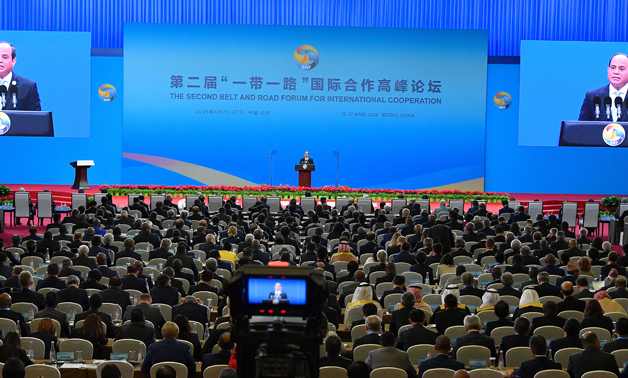In his speech at the opening session of the second Belt and Road Forum for International Cooperation (BRFIC), President Abdel Fatah El-Sisi called upon Chinese and member states of the Belt and Road Initiative (BRI) to invest in the inter-African megaprojects of Cairo-Cape Town Road and VICMED (a trade shipping route starting from Lake Victoria in Central Africa to the Mediterranean Sea).
The 10,300-kilometer-long Cape to Cairo Road or Pan-African Highway was a proposal since 1890s. It starts from Alexandria Port on the Mediterranean Sea then Cairo, Sudan, Southern Sudan, Ethiopia, Tanzania, Kenya, Zambia and finally South Africa.

President Abdel Fatah El-Sisi gives a speech at the opening session of the 2nd Belt and Road Forum on Friday, April 26, 2019- Press photo

President Abdel Fatah al-Sisi gives a speech at the opening session of the 2nd Belt and Road Forum on Friday, April 26, 2019- Press photo
“We welcomed reaching new partnership agreements in the framework of the Belts Road Initiative, with China and other the BRI member states to enhance Africa’s sustainable development efforts,” said President Sisi.
President Sisi affirmed that Egypt’s current leadership of the African Union has an important dimension for the BRI, which is consistent with African Union (AU) Development Goals of 2063 Vision and the United Nation (UN) 2030 development goals.
He said that the strong Egyptian-Chinese bilateral relations are represented in the 2014 comprehensive strategic partnership agreement, which came into force in 2016 after adopting a five-year executive program to implement the agreement conditions in all fields between both countries.
The Chinese Belt and Road Initiative (BRI) spot lights on fields that come on Egypt’s priorities of 2030 Vision for comprehensive development, mainly, in energy, infrastructure, information technology, and transportation, President Sisi said, added that the BRI is also consistent with Egypt’s priorities of economic stimulus, trade enhancement, and culture exchange.
“The initiative objectives are consistent with our efforts to launch a number of megaprojects that achieve high returns and create diversified investment opportunities; foremost of which is the Suez Canal Development Center. It is an industrial, commercial and logistic center that provides promising opportunities for Chinese companies and the member states of the initiative,” said President El-Sisi.

President Abdel Fatah al-Sisi gives a speech at the opening session of the 2nd Belt and Road Forum on Friday, April 26, 2019- Press photo
“It is a center for production and re-export the products to many countries worldwide, particularly the countries with which we [Egypt] have free trade agreements,” he added, noting that Egypt is implementing an economic reform program to provide a good environment for the foreign investments.
President Sisi also shed light on Egypt’s efforts in energy field and its strategic location of Suez Canal in transporting, storing and trading oil and gas products. Egypt is a center of freight transportation services for markets of Asia, the Middle East and Europe, President Sisi said.
Since the first edition of the BRFIC, which was held in May 2017, the Arab-Chinese relations witnessed a significant breakthrough, especially after the 8th Ministerial Conference of the China-Arab Cooperation Forum in July 2018 when the Arab-Chinese Implementing Declaration of the BRI was ratified, said President Sisi.
He added that new proposals for electricity linking between Arab countries and BRI member states are under consideration.
President Sisi arrived Beijing early Thursday to attend BRFIC. He visited China six times over the past five years.
The second edition of BRFIC is taking place on April 25 – 27, and attended by 37 heads of state, the United Nations secretary-general and the managing director of the International Monetary Fund (IMF). That is in addition to 5,000 from more than 150 countries, and 90 international organizations, reported CGTN.
The initiative was launched in 2013. Since then, BRI agreements were signed by 126 countries and 29 international organizations with China.
(Source: MENA)




